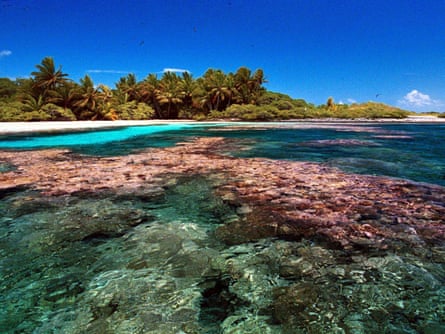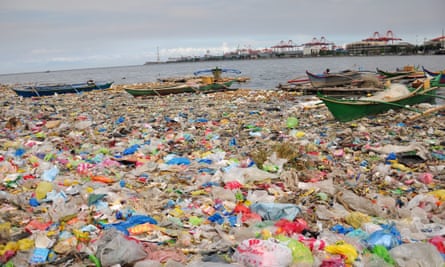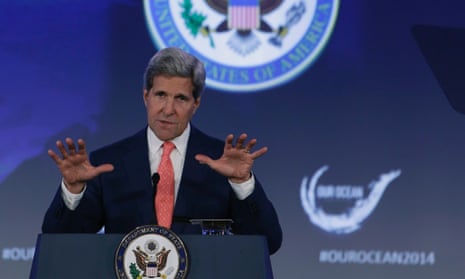The US secretary of state, John Kerry, says saving the world's oceans was a vital security issue, and has urged leaders at an international summit to take immediate action on overfishing and pollution.
Kerry, speaking at the start of the summit, said humans had caused “enormous damage” to the oceans, jeopardising the food security of three billion people on the planet.
The two-day conference includes officials from 80 countries, and is the most visible effort to date by the Obama administration to lead a global conservation effort for the oceans. To that end, the State Department on Monday announced that actor Leonardo DiCaprio, who recently donated $3m to Oceana, will attend the summit on Tuesday.
Kerry called on leaders to take immediate steps on overfishing, pollution, and changes in ocean chemistry caused by rising carbon dioxide emissions.
“No one should mistake that the protection of our oceans is a vital international security issue,” Kerry said.
“Most people under-estimate the enormous damage we as people are inflicting on our oceans every single day.”
Barack Obama will – once again – use his executive powers as president on Tuesday to announce new efforts for ocean protection, Kerry told the summit.
State department officials and environmental groups said they expected Obama to declare additional marine protection areas when he delivers a video message to the summit on Tuesday.
Campaign groups said they were also looking to Obama to order a new task force on illegal fishing. Obama is also expected to increase research funds for monitoring changes in ocean chemistry.

Other leaders were also expected to do their part.
A few minutes after Kerry left the stage, Kiribati's president, Anote Tong, said the Pacific Island state would close off a 157,630-sq-mile area to commercial fishing by the end of 2014. The fishing ban in the Phoenix Islands Protected Area, which represents about 11% of Kiribati's waters, would allow fish stocks to recover, Tong said.
Leaders will also be looking at how to stop plastic waste from ending up in the sea, and for reducing the amount of fertiliser which flows from farmland into waterways, creating ocean deadzones.
To some extent, the two-day summit is a crash course on ocean protection issues, with scientists recruited to provide briefings to government officials and seafood industry executives.
The most immediate was to halt a sharp decline in fisheries, because of overfishing and illegal catch, that is threatening food security.
“There is little to no doubt overfishing is probably the worst problem we have in the oceans today – worse than climate change, worse than pollution,” Boris Worm, a marine ecologist at Dalhousie University, said in an interview. Worm was due to address the conference by video on Monday.
Fish stocks in the developed world were recovering, because of better management. But fishermen in some of the poorest countries in the world – Mozambique, Senegal and Mauritania – were spending more time and more fuel and coming back with fewer fish.

“Fisheries are at a crossroads,” he said.
State department officials, briefing reporters last week, said that some of the technology – to detect illegal fishing, or monitor ocean chemistry – was already in existence. But it was not yet widely deployed.
“There are actual solutions that people are putting in place in this realm today that can serve as catalysts to do it on a wider basis,” Catherine Novelli, the undersecretary for economic growth, energy and the environment. “So we have the tools … and that means you can attack it more easily.”
The missing ingredient, other officials said, was political will – and that was where Kerry stepped in on Monday.
Kerry, who worked on climate change and environment during his long years in the Senate, has adopted ocean protection as a personal cause.
"The bottom line is that most people don’t realize that if the entire world doesn’t come together to try to change course and protect the ocean from unsustainable fishing practices, unprecedented pollution, or the devastating effects of climate change, then we run the risk of fundamentally breaking entire ecosystems."

Comments (…)
Sign in or create your Guardian account to join the discussion